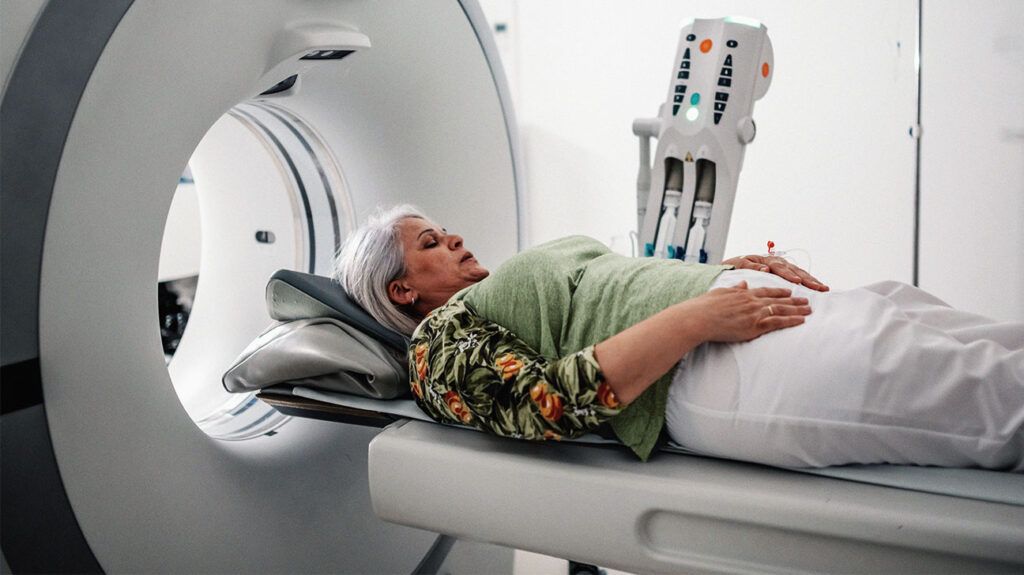Medicare only covers virtual colonoscopies, or CT colonoscopies, in rare cases where a traditional colonoscopy is not possible. Coverage may also only be available to check for or diagnose certain conditions.
A traditional colonoscopy uses a device called a colonoscope to look inside the colon and rectum. A virtual colonoscopy is an alternative test that uses a CT scanner instead of a colonoscope. This may be a more suitable alternative for people who are unable to receive a colonoscopy.
In most cases, Medicare will not cover a virtual colonoscopy. However, they may offer coverage in certain cases, such as when a medical professional is unable to complete a traditional colonoscopy due to an obstruction.
Read on to learn more about when Medicare may cover virtual colonoscopies, coverage for traditional colonoscopies, and more.

Medicare will only cover a virtual colonoscopy in rare circumstances when traditional colonoscopy is incomplete due to the inability to pass the colonoscope through the body.
This may be due to:
- an obstructing neoplasm, which is an abnormal mass of tissue
- internal scarring
- stricture or narrowing
- obstruction due to diverticular disease, radiation therapy, or prior surgery
- external compression
- long-term anticoagulation
- severe coagulopathy
- increased sedation risk, such as from previous severe chronic obstructive pulmonary disease (COPD) or previous adverse reaction to anesthesia
If it is possible to complete a traditional colonoscopy, then Medicare will not cover a virtual colonoscopy.
Medicare will also not cover a virtual colonoscopy if a traditional colonoscopy is incomplete due to reasons other than those specified.
It will also not cover a virtual colonoscopy for screening or tests where the individual does not have any signs or symptoms, regardless of whether a person has a family history or other factors that increase the likelihood of colonic disease.
In addition to a person requiring a virtual colonoscopy due to an incomplete traditional colonoscopy, a person may require the procedure to enable a healthcare professional to check for or diagnose a specific condition.
Examples of these conditions include:
- malignant or benign neoplasm
- gastrointestinal stromal tumor
- Crohn’s disease with intestinal obstruction
- chronic ulcerative pancolitis with intestinal obstruction
- volvulus
- intestinal adhesions with obstruction
- colon polyps
- toxic megacolon
- intestinal obstruction following surgery
It is important to note that coverage is not guaranteed. A person should contact Medicare to check whether there’s coverage for a virtual colonoscopy based on their individual circumstances.
If Medicare agrees to cover a virtual colonoscopy, Medicare Part B will provide coverage. Part B covers outpatient diagnostic tests.
If a person is already receiving inpatient hospital care when they require a virtual colonoscopy, Medicare Part A may cover the test.
Medicare Advantage may also cover a virtual colonoscopy, as every Advantage plan must include Original Medicare (parts A and B).
Learn more about Medicare Part A and Part B.
If a person is at high risk of colorectal cancer, Medicare will cover screenings with a traditional colonoscopy every 24 months (2 years).
If an individual is not at high risk of colorectal cancer, then Medicare will cover screenings either every 120 months (10 years), or 48 months (4 years) after a person has a flexible sigmoidoscopy.
If Medicare agrees to cover a traditional colonoscopy, but the medical professional is unable to complete the colonoscopy, there is no guarantee that Medicare will then cover a virtual colonoscopy. It is important to contact Medicare for information based on the individual circumstances.
Learn more about colorectal cancer screening.
A 2018 study suggests that the cost of a virtual colonoscopy can range from $330 to $1,081.
The cost of the test will differ greatly, depending on factors such as the location where the test takes place and who performs the test.
Total costs for the individual will also depend on whether Medicare covers the procedure. If Medicare does offer coverage under Part B, then the individual will still be responsible for 20% of the costs.
Medicare does not usually provide coverage for virtual colonoscopies, or CT colonoscopies. However, in rare cases a traditional colonoscopy is incomplete, such as due to an obstruction. Medicare may cover the virtual colonoscopy.
The test must also be medically necessary to check for or diagnose certain conditions. Examples include neoplasms, gastrointestinal stromal tumors, Crohn’s disease with intestinal obstruction, colon polyps, and toxic megacolon.
Medicare will not cover a virtual colonoscopy if a traditional colonoscopy is possible or if a person does not have any signs or symptoms that would make the test medically necessary.


